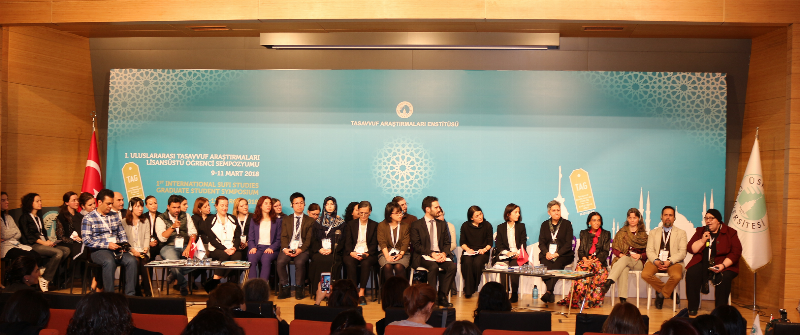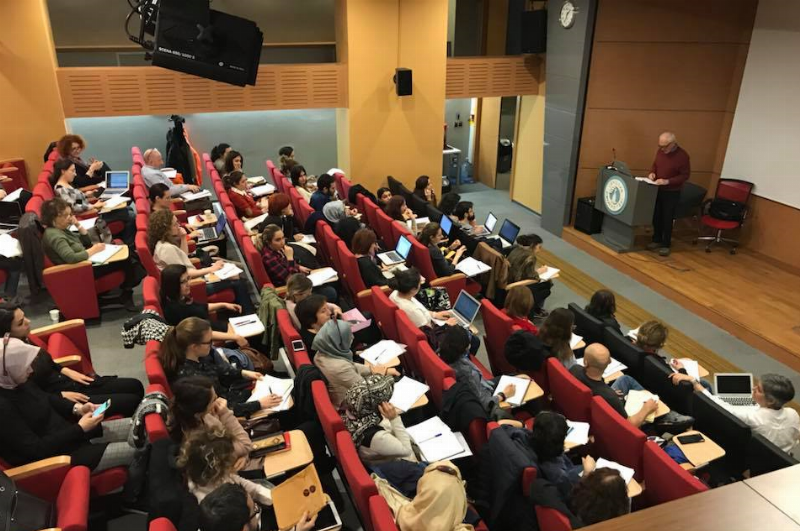The opportunity of postInstitute education in the field of Sufism is provided to interested researchers from all branches

What is Sufi Culture and Literature Master's Program?
The content of Sufi Culture and Literature Thesis & Non Thesis Master's Programs has been designed to integrate the subjects of Sufi doctrine, Sufi history and Sufi literature with the basic Islamic sciences, along with various disciplines of social sciences, especially the subjects of Islamic thought and civilization history. The program also aims to contribute to the production of interdisciplinary cultural studies based on the perspective of "Islamic civilization, Sufi thought and culture", which is originated in our own cultural geography. Taking a closer look allows us to see that almost every study related to civilization and culture in this geography is somehow related to the field of Sufism. Thus Sufism can offer new opportunities for Turkey in the fields of Area Studies and Religious Studies. Studies on Sufism can also bring new perspectives to those who are interested in sociology and human psychology today.
The Institute of Sufi Studies started its master's program titled "Sufi Culture and Literature" in February 2016 and admitted its first students in the Spring semester of the 2015-2016 academic year. The program provides students from all branches with the opportunity to do postinstitute degrees on Sufism and related subjects. The program is organized as thesis and non-thesis master's programs.

What is the Language of Instruction in the Sufi Culture and Literature Master's Program?
The language of instruction of the Sufi Culture and Literature Master's Program is Turkish. The scientific content of the program is designed by the Advisor of the Dean of the University of Uskudar, Prof. Dr. Mahmud Erol Kılıç. The program also teaches both Arabic and Ottoman Turkish, which are the research languages of the Sufi field. Teaching Arabic aims to increase the proficiency of students especially on classical texts. Persian is among the elective courses. Some courses in the elective category are given in English.
The Program Covers Many Fields of Science
Today, scientific studies and researches are moving away from the "profession-oriented" approach at a great speed. Many disciplines are more engaged with the topics and methodology of religious studies. The field of Sufism has a wide range of interests, from literature to philosophy, from history to sociology and psychology, from music to architecture, from political philosophy to popular culture, as well as basic Islamic sciences. Sufi culture, which is the product of more than a thousand years of Islamic civilization, is not only possible to preserve, but to make it viable, to penetrate the textures of daily life, to contribute more to our culture and world of thought, through developing new programs and institutional activities.
What are the Fields of Study of the Sufi Culture and Literature Master's Program?
It offers academic career and professional development opportunities with direct or interdisciplinary relations for those who come from theoretical and applied fields such as theology, literature, history, psychology, psychiatry, sociology, social anthropology, educational sciences, social work.
What are the Courses Taken in the Sufi Culture and Literature Master's Program?
Within the scope of the Sufi Culture and Literature Program, Sufi Thought, Sufi Literature and Text Analysis, Sufi History, Sufi Culture and Art courses, along with Arabic and Ottoman Turkish courses are given as compulsory courses. In the program, there are many elective courses such as History of Islamic Thought, Thought of Ibn Arabi, Thought of Mevlana, Sufi Classics, History of Sufism and Religions, History of Islamic Civilization, as well as text studies in which Sufi texts written in Ottoman Turkish are further examined along with Arabic Text Studies. Within the scope of the program, some elective courses are also offered in English, these courses are coordinated by the Institute and given by visiting lecturers from abroad.
What is the Scope and Duration of the Sufi Culture and Literature Master's Program?
Sufi Culture and Literature Master's Program with Thesis consists of a total of four semesters. The maximum time allowed for the student to complete the program is 6 semesters. Within the scope of the program, the student submits his thesis by taking 5 compulsory and 4 elective courses and a seminar.
The thesis master's program includes one semester of "Scientific Preparation". Scientific Preparation period is not included in the program duration. Except for those who institute from the Faculty of Theology, all students are obliged to take Scientific Preparation courses. Those who have the necessary language proficiency can be exempted from Scientific Preparation language courses. Preparation includes Ottoman Turkish, Introduction to Arabic and Introduction to Basic Islamic Sciences. The student can also optionally receive a one-year Arabic preparatory education which is carried out within the framework of a special protocol developed by the Institute with the 29 Mayıs University, Arabic Teaching Application and Research Center (ARÖMER).
Non-Thesis Sufi Culture and Literature Master's Program consists of 3 semesters in total. The maximum time allowed to complete the program is 3 semesters. Within the scope of the program, the student takes 7 compulsory and 3 elective courses and submits a term project. It is possible to switch from the non-thesis program to the thesis program.
Is there a Compulsory Attendance in the Master's Program in Sufi Culture and Literature?
Students enrolled in the Sufi Culture and Literature Master's Program are required to attend all courses. However, if the non-attendance in theoretical or applied courses does not exceed 30% and there is a just and valid reason, absence may occur.
Who Can Apply to the Sufi Culture and Literature Master's Program?
Candidates from all branches who institute from 4-year underinstitute programs of universities can apply to the Sufi Culture and Literature Master's Program. Candidates who have completed their university education abroad are required to have YÖK equivalency.
Candidates who will apply to the Thesis Master's Program must have received at least 55 from ALES in any type of score in the last five years. ALES requirement is not required for applicants to the Non-Thesis Program.
Students are admitted to Thesis and Non Thesis Sufi Culture and Literature Master's Programs by a written exam. The exam is not an academic exam related to the field, but is conducted to understand the candidate's reading and comprehension skills, written skills, and to determine their expectations and current interests about the program.
Foreign student's ALES score of 75 is accepted without taking the exam. As for Turkish citizens and those completed high school abroad, the ALES score of 55 is accepted without taking the exam.
